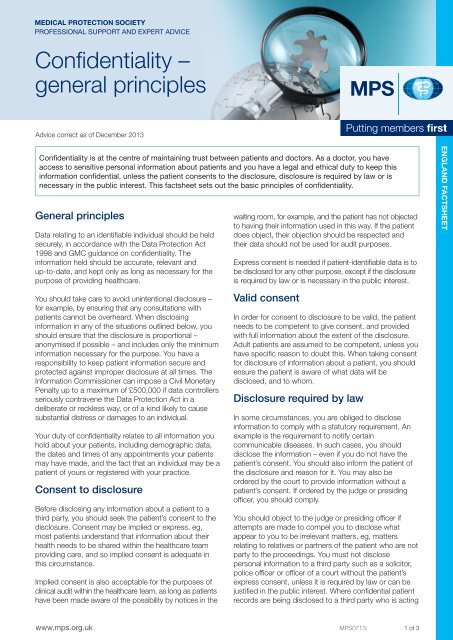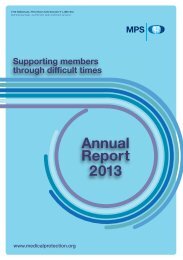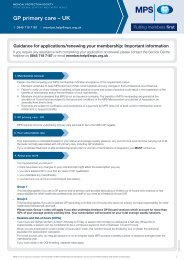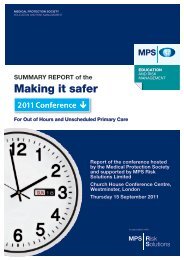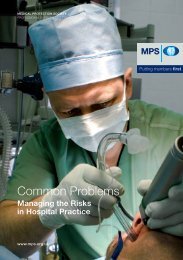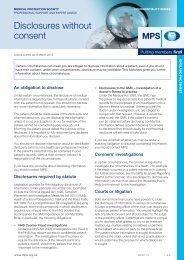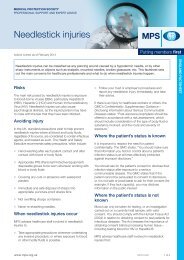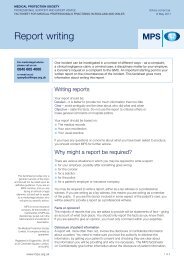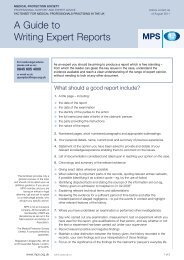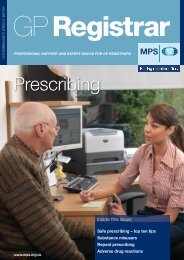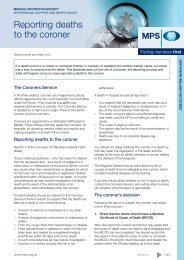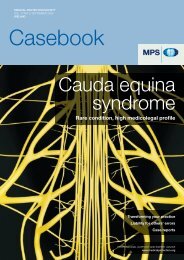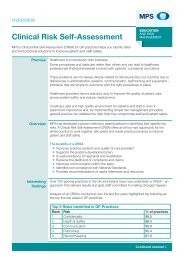Confidentiality – general principles - Medical Protection Society
Confidentiality – general principles - Medical Protection Society
Confidentiality – general principles - Medical Protection Society
You also want an ePaper? Increase the reach of your titles
YUMPU automatically turns print PDFs into web optimized ePapers that Google loves.
MEDICAL PROTECTION SOCIETY<br />
PROFESSIONAL SUPPORT AND EXPERT ADVICE<br />
<strong>Confidentiality</strong> <strong>–</strong><br />
<strong>general</strong> <strong>principles</strong><br />
Advice correct as of December 2013<br />
<strong>Confidentiality</strong> is at the centre of maintaining trust between patients and doctors. As a doctor, you have<br />
access to sensitive personal information about patients and you have a legal and ethical duty to keep this<br />
information confidential, unless the patient consents to the disclosure, disclosure is required by law or is<br />
necessary in the public interest. This factsheet sets out the basic <strong>principles</strong> of confidentiality.<br />
General <strong>principles</strong><br />
Data relating to an identifiable individual should be held<br />
securely, in accordance with the Data <strong>Protection</strong> Act<br />
1998 and GMC guidance on confidentiality. The<br />
information held should be accurate, relevant and<br />
up-to-date, and kept only as long as necessary for the<br />
purpose of providing healthcare.<br />
You should take care to avoid unintentional disclosure <strong>–</strong><br />
for example, by ensuring that any consultations with<br />
patients cannot be overheard. When disclosing<br />
information in any of the situations outlined below, you<br />
should ensure that the disclosure is proportional <strong>–</strong><br />
anonymised if possible <strong>–</strong> and includes only the minimum<br />
information necessary for the purpose. You have a<br />
responsibility to keep patient information secure and<br />
protected against improper disclosure at all times. The<br />
Information Commissioner can impose a Civil Monetary<br />
Penalty up to a maximum of £500,000 if data controllers<br />
seriously contravene the Data <strong>Protection</strong> Act in a<br />
deliberate or reckless way, or of a kind likely to cause<br />
substantial distress or damages to an individual.<br />
Your duty of confidentiality relates to all information you<br />
hold about your patients, including demographic data,<br />
the dates and times of any appointments your patients<br />
may have made, and the fact that an individual may be a<br />
patient of yours or registered with your practice.<br />
Consent to disclosure<br />
Before disclosing any information about a patient to a<br />
third party, you should seek the patient’s consent to the<br />
disclosure. Consent may be implied or express, eg,<br />
most patients understand that information about their<br />
health needs to be shared within the healthcare team<br />
providing care, and so implied consent is adequate in<br />
this circumstance.<br />
Implied consent is also acceptable for the purposes of<br />
clinical audit within the healthcare team, as long as patients<br />
have been made aware of the possibility by notices in the<br />
waiting room, for example, and the patient has not objected<br />
to having their information used in this way. If the patient<br />
does object, their objection should be respected and<br />
their data should not be used for audit purposes.<br />
Express consent is needed if patient-identifiable data is to<br />
be disclosed for any other purpose, except if the disclosure<br />
is required by law or is necessary in the public interest.<br />
Valid consent<br />
In order for consent to disclosure to be valid, the patient<br />
needs to be competent to give consent, and provided<br />
with full information about the extent of the disclosure.<br />
Adult patients are assumed to be competent, unless you<br />
have specific reason to doubt this. When taking consent<br />
for disclosure of information about a patient, you should<br />
ensure the patient is aware of what data will be<br />
disclosed, and to whom.<br />
Disclosure required by law<br />
In some circumstances, you are obliged to disclose<br />
information to comply with a statutory requirement. An<br />
example is the requirement to notify certain<br />
communicable diseases. In such cases, you should<br />
disclose the information <strong>–</strong> even if you do not have the<br />
patient’s consent. You should also inform the patient of<br />
the disclosure and reason for it. You may also be<br />
ordered by the court to provide information without a<br />
patient’s consent. If ordered by the judge or presiding<br />
officer, you should comply.<br />
You should object to the judge or presiding officer if<br />
attempts are made to compel you to disclose what<br />
appear to you to be irrelevant matters, eg, matters<br />
relating to relatives or partners of the patient who are not<br />
party to the proceedings. You must not disclose<br />
personal information to a third party such as a solicitor,<br />
police officer or officer of a court without the patient’s<br />
express consent, unless it is required by law or can be<br />
justified in the public interest. Where confidential patient<br />
records are being disclosed to a third party who is acting<br />
ENGLAND FACTSHEET<br />
www.mps.org.uk<br />
MPS0713:<br />
1 of 3
as the patient’s agent under the DPA, full disclosure in<br />
accordance with the act should normally take place.<br />
However, if you believe the patient may not appreciate<br />
the nature and extent of the disclosure it would be<br />
prudent to confirm their agreement before proceeding.<br />
Where information from the records is being disclosed in<br />
other circumstances, you should make sure the<br />
disclosure is in accordance with the patient’s consent.<br />
DPA disclosures must be vetted for third party<br />
information and harmful information, and this information<br />
should be redacted.<br />
Where a data controller cannot comply with the request<br />
without disclosing information relating to another<br />
individual who can be identified from that information, he<br />
is not obliged to comply with the request unless —<br />
ICO advice states that a competent child has the right to<br />
make their own application for disclosure under the DPA,<br />
and accordingly any application by a parent (or any other<br />
party) at this point, can only be with the child’s consent.<br />
Prior to the child becoming competent, someone with<br />
parental responsibility can exercise the right on the<br />
child’s behalf, as long as it is in the child’s best interests.<br />
You should allow access by competent patients unless:<br />
■■<br />
■■<br />
It is likely to cause serious harm to the patient or<br />
another person<br />
The records refer to another person (excluding<br />
healthcare professionals) who has not given consent<br />
to disclosure.<br />
ENGLAND FACTSHEET<br />
(a) the other individual has consented to the disclosure<br />
of the information to the person making the request, or<br />
(b) it is reasonable in all the circumstances to comply<br />
with the request without the consent of the other<br />
individual.Where the patient refuses to authorise a full<br />
disclosure of information to a third party, that party must<br />
be made aware that information has been withheld at the<br />
patient’s request.<br />
Disclosures in the public interest<br />
In some cases, it is not possible to obtain the patient’s<br />
consent, such as when the patient is not contactable.<br />
Alternatively, the patient may have expressly refused<br />
their consent. If you believe that disclosure is necessary<br />
in the public interest, and that the benefits from<br />
disclosure outweigh the risks from doing so, it may be<br />
justified to disclose the information, even without the<br />
patient’s consent.<br />
Such circumstances usually arise where there is a risk of<br />
death or serious harm to the patient or others. If<br />
possible, you should seek the patient’s consent and/or<br />
inform them of the disclosure before doing so. Examples<br />
of such a situation would include one in which disclosure<br />
of information may help in the prevention, detection or<br />
prosecution of<br />
a serious crime. A competent adult’s wishes should<br />
<strong>general</strong>ly be respected if they refuse to allow disclosure<br />
and no-one else will suffer.<br />
The GMC has produced supplementary guidance on<br />
Disclosing information about serious communicable<br />
diseases. For more information see the MPS factsheet<br />
<strong>Confidentiality</strong> <strong>–</strong> Disclosures Without Consent.<br />
Disclosures involving patients who<br />
are not competent adults<br />
Children and young people under 18 years<br />
The Information Commissioner’s Office (ICO) is<br />
responsible for governing data protection compliance.<br />
If a young person is able to understand the implications<br />
of the disclosure, they are able to give their consent,<br />
regardless of age. Once children have the capacity to<br />
make decisions about their own treatment, they are also<br />
entitled to decide whether personal information may be<br />
passed on.<br />
Patients lacking capacity<br />
Under the Mental Capacity Act 2005, adults are<br />
assumed to have capacity unless they have an<br />
impairment affecting their mind (eg, dementia), which<br />
means they are unable to make a specific decision at a<br />
particular time. There is also a requirement to ensure all<br />
practical steps have been taken to help the individual<br />
make a decision.<br />
If a patient lacks capacity, you should act in their best<br />
interests when deciding whether to disclose the<br />
information. You must consider the views of anyone the<br />
patient asks you to consult, or who has legal authority to<br />
make a decision on their behalf, or has been appointed<br />
to represent them.<br />
After a patient has died<br />
Your duty of confidentiality to your patient remains after<br />
death. In some situations, such as a complaint arising<br />
after a patient’s death, you should discuss relevant<br />
information with the family, especially if the patient was a<br />
child. If you reasonably believe that the patient wished<br />
that specific information should remain confidential after<br />
their death, or if the patient has asked, you should<br />
usually respect that wish.<br />
The “personal representative” of the patient (usually an<br />
executor of the will, or an administrator if there is no will)<br />
can apply for access to the relevant part of a patient’s<br />
medical records (excepting harmful or third party<br />
information), as can someone who has a claim arising<br />
out of the patient’s death (eg, for a life assurance claim),<br />
or a claim in negligence.<br />
In respect of disclosure potentially associated with<br />
assisted suicide (eg, to Dignitas), specific advise should<br />
be sought from MPS prior to disclosure.<br />
www.mps.org.uk Image © Günay Mutlu / iStockphoto.com MPS0713: 2 of 3
Social media<br />
Some newer forms of communication <strong>–</strong> such as social<br />
media <strong>–</strong> are ubiquitous, and medicine’s high profile<br />
among the news media means that the confidentiality of<br />
patient information is facing newer risks.<br />
In para 69 of Good <strong>Medical</strong> Practice, the GMC says:<br />
“When communicating publicly, including speaking to or<br />
writing in the media, you must maintain patient<br />
confidentiality. You should remember when using social<br />
media that communications intended for friends or family<br />
may become more widely available.”<br />
Further information<br />
■■<br />
■■<br />
GMC, <strong>Confidentiality</strong> (2009) <strong>–</strong> www.gmc-uk.org<br />
DH, <strong>Confidentiality</strong> and Access to Health Records<br />
<strong>–</strong> www.dh.gov.uk<br />
■■<br />
MPS factsheet, Parental Responsibility <strong>–</strong><br />
www.medicalprotection.org/uk/factsheets<br />
■■<br />
GMC, Making and Using Visual and Audio Recordings<br />
of Patients <strong>–</strong> Guidance for Doctors (2011) <strong>–</strong><br />
www.gmc-uk.org/recordings<br />
ENGLAND FACTSHEET<br />
In its explanatory guidance, Doctors’ Use of Social<br />
Media, the GMC says: “Many doctors use professional<br />
social media sites that are not accessible to the public.<br />
Such sites can be useful places to find advice about<br />
current practice in specific circumstances. However, you<br />
must still be careful not to share identifiable information<br />
about patients.<br />
“Although individual pieces of information may not<br />
breach confidentiality on their own, the sum of published<br />
information online could be enough to identify a patient<br />
or someone close to them.<br />
“You must not use publicly accessible social media to<br />
discuss individual patients or their care with those<br />
patients or anyone else.”<br />
■■<br />
GMC, Good <strong>Medical</strong> Practice (2013) <strong>–</strong><br />
www.gmc-uk.org<br />
■■<br />
GMC, Doctors’ Use of Social Media (2013) <strong>–</strong><br />
www.gmc-uk.org/Doctors__use_of_social_media.<br />
pdf_51448306.pdf<br />
■■<br />
Data <strong>Protection</strong> Act (1998), Right of Access to<br />
Personal Data <strong>–</strong><br />
www.legislation.gov.uk/ukpga/1998/29/section/7<br />
For medicolegal advice please call us on:<br />
0845 605 4000<br />
or email us at: querydoc@mps.org.uk<br />
This factsheet provides only a <strong>general</strong> overview of the topic and should not be relied upon as definitive<br />
guidance. If you are an MPS member, and you are facing an ethical or legal dilemma, call and ask to speak<br />
to a medicolegal adviser, who will give you specific advice.<br />
MPS is not an insurance company. All the benefits of membership of MPS are discretionary as set out in the<br />
Memorandum and Articles of Association. The <strong>Medical</strong> <strong>Protection</strong> <strong>Society</strong> Limited. A company limited by<br />
guarantee. Registered in England No. 36142 at 33 Cavendish Square, London, W1G 0PS.<br />
www.mps.org.uk<br />
Image © Günay Mutlu / iStockphoto.com<br />
MPS0713: 3 of 3


